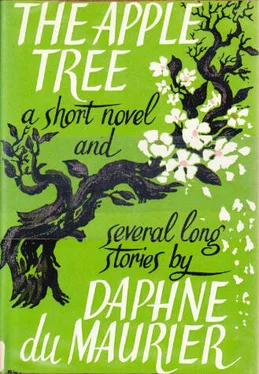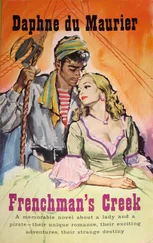Daphne du Maurier - The Apple Tree - a short novel & several long stories
Здесь есть возможность читать онлайн «Daphne du Maurier - The Apple Tree - a short novel & several long stories» весь текст электронной книги совершенно бесплатно (целиком полную версию без сокращений). В некоторых случаях можно слушать аудио, скачать через торрент в формате fb2 и присутствует краткое содержание. Жанр: Современная проза, Триллер, Социально-психологическая фантастика, на английском языке. Описание произведения, (предисловие) а так же отзывы посетителей доступны на портале библиотеки ЛибКат.
- Название:The Apple Tree: a short novel & several long stories
- Автор:
- Жанр:
- Год:неизвестен
- ISBN:нет данных
- Рейтинг книги:5 / 5. Голосов: 1
-
Избранное:Добавить в избранное
- Отзывы:
-
Ваша оценка:
- 100
- 1
- 2
- 3
- 4
- 5
The Apple Tree: a short novel & several long stories: краткое содержание, описание и аннотация
Предлагаем к чтению аннотацию, описание, краткое содержание или предисловие (зависит от того, что написал сам автор книги «The Apple Tree: a short novel & several long stories»). Если вы не нашли необходимую информацию о книге — напишите в комментариях, мы постараемся отыскать её.
The Apple Tree: a short novel & several long stories — читать онлайн бесплатно полную книгу (весь текст) целиком
Ниже представлен текст книги, разбитый по страницам. Система сохранения места последней прочитанной страницы, позволяет с удобством читать онлайн бесплатно книгу «The Apple Tree: a short novel & several long stories», без необходимости каждый раз заново искать на чём Вы остановились. Поставьте закладку, и сможете в любой момент перейти на страницу, на которой закончили чтение.
Интервал:
Закладка:
The savour of a love affair should be quite otherwise, thought the Marquise, and breaking off a rose that climbed the trellis of the balcony, she placed it in the opening of her dress, below her neck. A love affair should be a thing of silence, soft, unspoken. No raucous voice, no burst of sudden laughter, but the kind of stealthy curiosity that comes with fear, and when the fear has gone, a brazen confidence. Never the give-and-take between good friends, but passion between strangers…
One by one they came back from the sands, the visitors to the hotel. The tables began to fill up. The terrace, hot and deserted all the morning, became alive once more. And guests, arriving by car for luncheon only, mingled with the more familiar figures belonging to the hotel. A party of six in the right-hand corner. A party of three below. And now more bustle, more chatter, more tinkling of glasses and clatter of plates, so that the splash of the sea, which had been the foremost sound since early morning, now seemed secondary, remote. The tide was going out, the water rippling away across the sands.
Here came the children with their governess, Miss Clay. They prinked their way like little dolls across the terrace, followed by Miss Clay in her striped cotton dress, her crimped hair straggling from her bathe, and suddenly they looked up to the balcony, they waved their hands, " Maman… maman…" She leant down, smiling at them; and then, as usual, the little clamour brought distraction. Somebody glanced up with the children, smiling, some man, at a left-hand table, laughed and pointed to his companion, and it began, the first wave of admiration that would come again in full measure when she descended, the Marquise, the beautiful Marquise and her cherubic children, whispers wafting towards her in the air like the smoke from the cigarettes, like the conversation the guests at the other tables shared with one another. This, then, was all that déjeuner on the terrace would bring to her, day after day, the ripple of admiration, respect, and then oblivion. Each and all went his way, to swim, to golf, to tennis, to drive, and she was left, beautiful, unrullled, with the children and Miss Clay.
"Look, maman, I found a little star-fish on the beach, I am going to take him home with me when we go."
"No, no, that isn't fair, it's mine. I saw it first."
The little girls, with flushed faces, fell out with one another.
"Hush, Céleste and Hélène: you make my head ache."
"Madame is tired? You must rest after lunch. It will do you good, in such heat." Miss Clay, tactful, bent down to scold the children. "Everyone is tired. It will do us all good to rest," she said.
Rest… But, thought the Marquise, I never do anything else. My life is one long rest. Il faut reposer. Repose-toi, ma chérie, tu as mauvaise mine. Winter and summer, those were the words she heard. From her husband, from the governess, from sisters-in-law, from all those aged, tedious friends. Life was one long sequence of resting, of getting up, and of resting again. Because with her pallor, with her reserve, they thought her delicate. Heavens above, the hours of her married life she had spent resting, the bed turned down, the shutters closed. In the house in Paris, in the chateau in the country. Two to four, resting, always resting.
"I'm not in the least tired," she said to Miss Clay, and for once her voice, usually melodious and soft, was sharp, high-pitched. "I shall go walking after lunch. I shall go into the town."
The children stared at her, round·eyed, and Miss Clay, her goat-face startled to surprise, opened her mouth in protest.
"You'll kill yourself, in the heat. Besides, the few shops always close between one and three. Why not wait until after tea? Surely it would be wiser to wait until after tea? The children could go with you and I could do some ironing."
The Marquise did not answer. She rose from the table, and now, because the children had lingered over déjeuner — Céleste was always slow with her food — the terrace was almost deserted. No one of any importance would watch the progress back to the hotel.
The Marquise went upstairs and once again touched her face with powder, circled her mouth, dipped her fore-finger in scent. Next door she could hear the droning of the children as Miss Clay settled them to rest and closed the shutters. The Marquise took her handbag, made of plaited straw, put in it her purse, a roll of film, a few odds and ends, and tip-toeing past the children's room went downstairs again, and out of the hotel grounds into the dusty road.
The gravel forced its way at once into her open sandals and the glare of the sun beat down upon her head, and at once what had seemed to her, on the spur of the moment, an unusual thing to do struck her now, in the doing of it, as foolish, pointless. The road was deserted, the sands were deserted, the visitors who had played and walked all morning, while she had lain idle on her balcony, were now taking their ease in their rooms, like Miss Clay and the children. Only the Marquise trod the sun-baked road into the little town.
And here it was even as Miss Clay had warned her. The shops were closed, the sun-blinds were all down, the hour of siesta, inviolate, unbroken, held sway over the shops and their inhabitants.
The Marquise strolled along the street, her straw handbag swinging from her hand, the one walker in a sleeping, yawning world. Even the café at the corner was deserted, and a sand-coloured dog, his face between his paws, snapped with closed eyes at the flies that bothered him. Flies were everywhere. They buzzed at the window of the pharmacie, where dark bottles, filled with mysterious medicine, rubbed glass shoulders with skin tonic, sponges and cosmetics. Flies danced behind the panes of the shop filled with sun-shades, spades, pink dolls and rope-soled shoes. They crawled upon the empty blood-stained slab of the butcher's shop, behind the iron shutter. From above the shop came the jarring sound of the radio, suddenly switched off, and the heavy sigh of someone who would sleep and would not be disturbed. Even the bureau de poste was shut. The Marquise, who had thought to buy stamps, rattled the door to no purpose.
Now she could feel the sweat trickling under her dress, and her feet, in the thin sandals, ached from the short distance she had walked. The sun was too strong, too fierce, and as she looked up and down the empty street, and at the houses, with the shops between, every one of them closed from her, withdrawn into the blessed peace of their siesta, she felt a sudden longing for any place that might be cool, that might be dark — a cellar, perhaps, where there was dripping water from a tap. The sound of water, falling to a stone floor, would soothe her nerves, now jagged from the sun.
Frustrated, almost crying, she turned into an alley-way between two shops. She came to steps, leading down to a little court where there was no sun, and paused there a moment, her hand against the wall, so cold and firm. Beside her there was a window, shuttered, against which she leant her head, and suddenly, to her confusion, the shutter was withdrawn and a face looked out upon her from some dark room within.
"Je regrette…" she began, swept to absurdity that she should be discovered here, intruding, like one peering into the privacy and squalor of life below a shop. And then her voice dwindled and died away, foolishly, for the face that looked out upon her from the open window was so unusual, so gentle, that it might have come straight from a stained-glass saint in a cathedral. His face was framed in a cloud of dark curled hair, his nose was small and straight, his mouth a sculptured mouth, and his eyes, so solemn, brown and tender, were like the eyes of a gazelle.
"Vous désirez, Madame la Marquise?" he said, in answer to her unfinished words.
Читать дальшеИнтервал:
Закладка:
Похожие книги на «The Apple Tree: a short novel & several long stories»
Представляем Вашему вниманию похожие книги на «The Apple Tree: a short novel & several long stories» списком для выбора. Мы отобрали схожую по названию и смыслу литературу в надежде предоставить читателям больше вариантов отыскать новые, интересные, ещё непрочитанные произведения.
Обсуждение, отзывы о книге «The Apple Tree: a short novel & several long stories» и просто собственные мнения читателей. Оставьте ваши комментарии, напишите, что Вы думаете о произведении, его смысле или главных героях. Укажите что конкретно понравилось, а что нет, и почему Вы так считаете.












